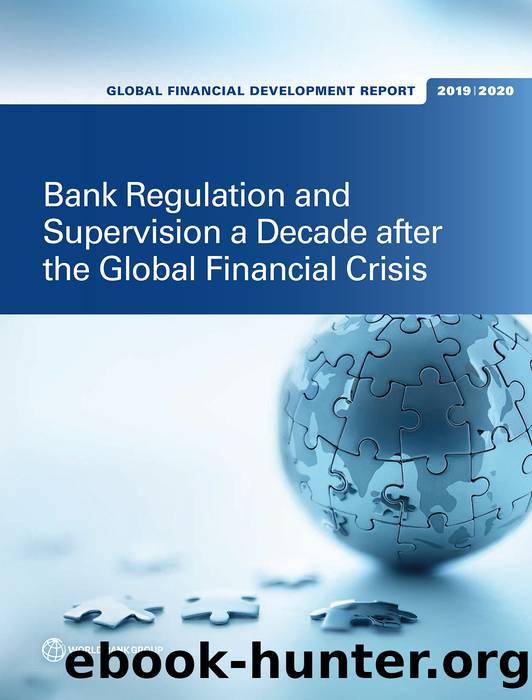Global Financial Development Report 20192020: Bank Regulation and Supervision a Decade after the Global Financial Crisis by The World Bank

Author:The World Bank
Language: eng
Format: epub
There must be institutions in place and mechanisms available for market participants to exercise market discipline. Information generation and provision of ancillary financial services, such as credit ratings, tend to have high fixed costs. These require a certain level of market development, which can be curtailed by the lack of scale and insufficient market depthâimportant hindrances in developing countries. Enabling a competitive environment that makes it easier for depositors and other investors to shift their investments between banks according to their assessments of relative risk is also important. Effective private monitoring also requires strong adherence to the rule of law. In particular, enforcing debt contracts and covenants, holding directors and managers accountable for fraud, and protecting minority shareholders from self-dealing all require a strong, independent judiciary and laws protecting shareholder and creditor rights.
Significant cross-country differences in institutional environments imply that proportionality must be kept in mind in thinking about the rules and regulations meant to strengthen market discipline. Simplified prudential rules and requirements can be applied for small or noncomplex institutions in order to avoid excessive compliance costs. This possibility is especially important for smaller banks in developing countries, which may lack the economies of scale for the compliance function. Proportionality should apply not only to regulations but also to supervision. Smaller developing countries may lack informational and operational infrastructure and face steep scale curves in the supervision and enforcement functions. Proportionality must be kept in mind to use supervisorsâ scarce resources effectively, thereby maximizing the desired social objectives. This need may in some cases imply a lower degree of stringency and simplified enforcement processes for smaller and less complex institutions.
Download
This site does not store any files on its server. We only index and link to content provided by other sites. Please contact the content providers to delete copyright contents if any and email us, we'll remove relevant links or contents immediately.
International Integration of the Brazilian Economy by Elias C. Grivoyannis(111057)
The Radium Girls by Kate Moore(12026)
Turbulence by E. J. Noyes(8047)
Nudge - Improving Decisions about Health, Wealth, and Happiness by Thaler Sunstein(7706)
The Black Swan by Nassim Nicholas Taleb(7128)
Rich Dad Poor Dad by Robert T. Kiyosaki(6631)
Pioneering Portfolio Management by David F. Swensen(6300)
Man-made Catastrophes and Risk Information Concealment by Dmitry Chernov & Didier Sornette(6019)
Zero to One by Peter Thiel(5798)
Secrecy World by Jake Bernstein(4751)
Millionaire: The Philanderer, Gambler, and Duelist Who Invented Modern Finance by Janet Gleeson(4478)
The Age of Surveillance Capitalism by Shoshana Zuboff(4291)
Skin in the Game by Nassim Nicholas Taleb(4248)
The Money Culture by Michael Lewis(4206)
Bullshit Jobs by David Graeber(4190)
Skin in the Game: Hidden Asymmetries in Daily Life by Nassim Nicholas Taleb(4004)
The Dhandho Investor by Mohnish Pabrai(3764)
The Wisdom of Finance by Mihir Desai(3746)
Blockchain Basics by Daniel Drescher(3581)
